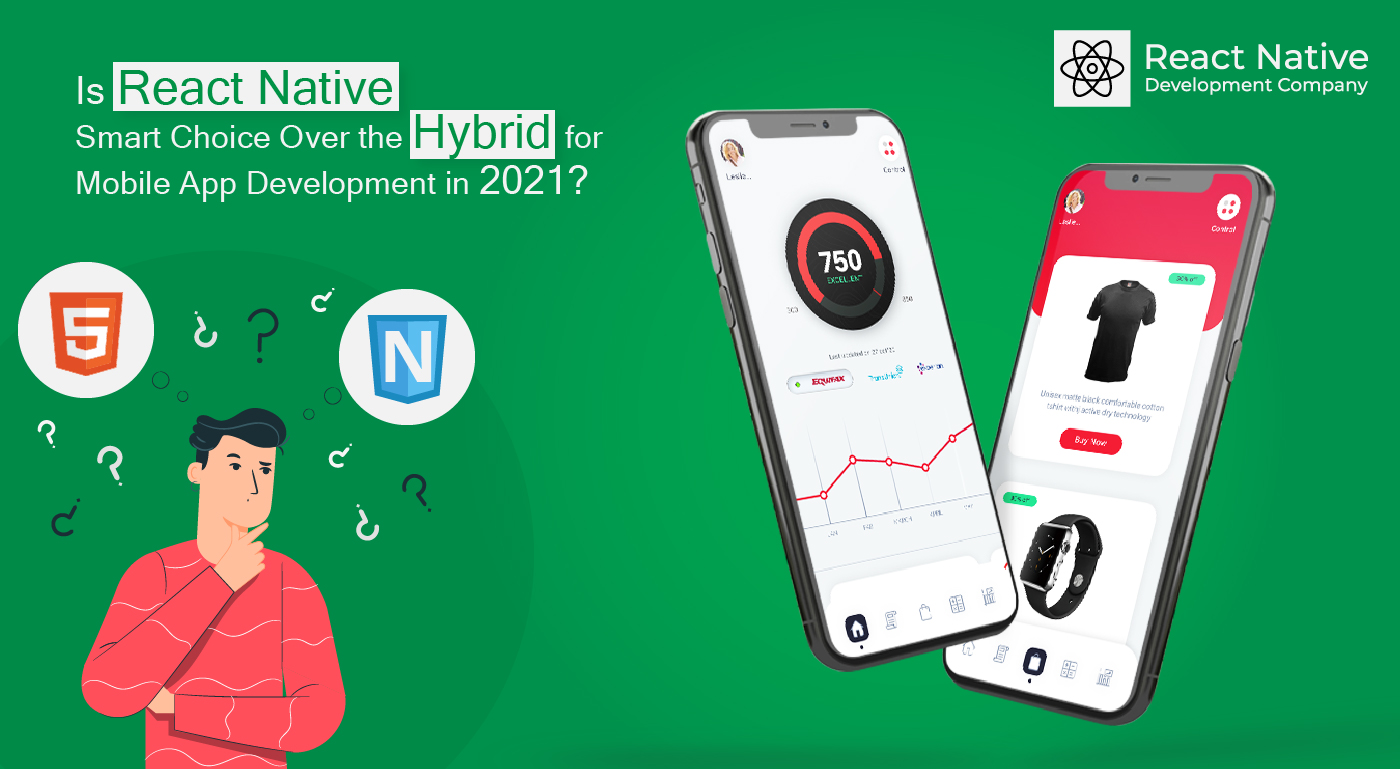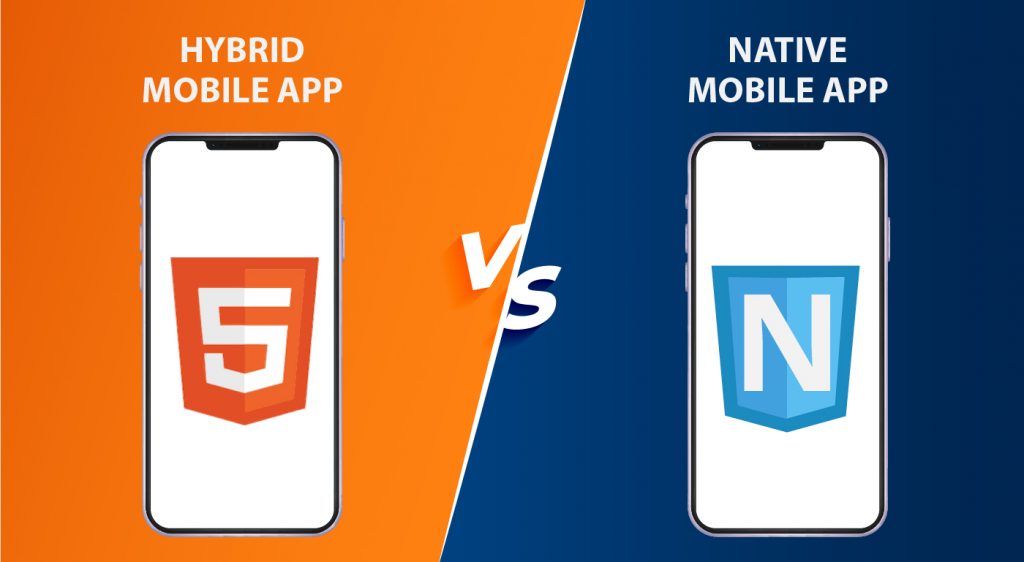
Is React Native Smart Choice Over the Hybrid for Mobile App Development in 2021?
A dish of Italian food or a Mughlai treat, which one to go for? This might be the dilemma in your mind while ordering food from a renowned and highly rated food ordering application. But have you wondered about the dilemma of the creators behind this application? There is a humongous amount of effort and time that goes into building an application that works seamlessly on your mobile phones with a friendly interface.
One major predicament faced by mobile application developers is to choose between the development platforms- whether to give React Native the lead or go hand in hand with the former framework- Hybrid? This one debate has taken the mobile development world by storm. While some developers have already switched to 2015-originated React Native, others are still affiliated with the old Hybrid.
The question here is, which one would take the lead and why?

In this blog, the developers and the potential entrepreneurs or any other business-leading moguls will be able to form the right perception and thereby the right choice for their windfall. We will talk in detail about:
« What is React Native?
« What is Hybrid?
« How React Native leaps against Hybrid?
« What do React Native development services have for businesses?
« An Inference
React Native: What is it?
React Native is an open-source application development platform. It is widely used to cultivate mobile applications for both Android and iOS. It has been in use since 2015 when it originated. Since then, React Native has proved to be a good friend of the developers. React Native is originally a JavaScript framework designed to develop robust, high-fidelity, and highly accustomed mobile applications for various business ventures and other professions. In today’s digital world, when marketing emanates as a significant aspect in a variety of professions, mobile applications have taken the lead in doing the work for you.
If reaching out to a huge number of people seems difficult, if keeping the records seems a tiresome task, or even if you wish to uplift your business venture a notch up, do consider developing a mobile application that reflects your work, describes the nature of your job, helps you to maintain a good status among your competitors.
After considering developing an application, the next step is to choose the framework from which your applications should be developed. Now, this moot has long been discussed, yet not resolved.
- Launched by Facebook in early 2015, React Native development companies make a considerable profit from the enormous demands of various business ventures, startups, Facebook creators, Bloomberg, and many others.
- React Native applications are also designed using a combination of JavaScript and XM-Esque markup, known as JSX.
- Then, under the vicinity, the React Native ‘bridge’ conjures the native rendering APIs in objective Java for Android, whereas C for iOS. This allows the application to render using real UI components, not web views, thus resembling any other mobile application.
- Easy to work with, React Native is the preferred choice of most developers.
Hybrid: What is it?
Hybrid apps are applications that are formed after combining native applications and web applications. These are the web apps that are put into the native app shells. Hybrid apps contain the elements of both web and native applications. These applications are developed by operating HTML, CSS, and JavaScript, and then eventually enclosed in the native application using platforms such as Cordova.
- The hybrid applications stand a chance to be a bit popular because of the feature that allows the code for mobile applications, thus being developed to be written only once by the developers.
- Hybrid apps tend to add an extra layer between the source code and the target platform.
- Hybrid apps are similar to web apps in functioning. But, they can be downloaded just like the native applications front app stores and play store.
- In hybrid apps, the rendering is done through the usage of the device’s browser. The rendering of HTML, JavaScript, and APIs is down through the device’s browser engine to access the device-specific hardware.
- Hybrid apps have been in demand for a very long time. Get the perfect blend of native app and web solutions to conclude an efficient hybrid app that helps in your rapid growth.
- Instagram, Uber, Gmail, and Twitter have been using the hybrid framework for a long time and have benefitted subsequently.
- Offline support is not a problem in hybrid applications. They can work even if the internet connection is not available. This feature is a significant windfall of hybrid apps over other frameworks.
- Apart from these advantages, hybrid apps are easy to maintain for developers.
Read also: How Is React Native Different From ReactJS?
Yet, the debate is not over. Whether it is the React Native apps or hybrid apps that will give your business a boost such that you take the path leading to higher altitudes is still in vacillation. Let us now take a look at the features that make React Native a superior framework to Hybrid.
- Smooth Endeavour with the Advantage of Higher speed: React Native custom app development is done through the same components that are used with native applications- both Android and iOS. On the other hand, Hybrid apps were developed to demonstrate a simple web view wrapped up in a native container and nothing more than that. The originality of the hybrid apps is lost and thus leads to friskier quaHow React Native Leaps Against Hybrid?
- The unsatisfactory user experience of hybrid apps: with the bars of User Interfaces and User Experience (UI/UX) risen to great heights over the past few years, Hybrid has not been able to reach those altitudes. Hybrid doesn’t seem to provide a seamless and user-friendly UI and UX to its end customers. Businesses that are not on the verge of compromising on their customers’ experience tend to refrain from using hybrid apps since those can’t be trusted. When it comes to providing a connoisseur of elevated user experience, maximum support goes to React Native apps. With React Native app development services, both the users and the developers gain confidence in minimizing glitches in the applications.
- quality content: The speed is compromised, the user experience is compromised, and the application’s functioning is not smooth in a hybrid app.
- Time and Effort Conservation: with single codebase nature, React Native app development company is at least a step ahead of the hybrid ones because of this magnanimous feature helping the developers save their effort and their client, time. While talking about the benefits of React Native app development services over other app development platforms, this particular feature is never to be ignored. The major windfall of React Native custom app development is its ability to use the single close for multiple platforms without having to worry about repeated exertion.
- Advantage of ReactJS Web Language: React native app development companies use the conceptual ReactJS web language to support their applications. When juxtaposing the two frameworks, the scale weighs heavier on the React Native side, subsequent to the addition of points one after the other. React Native is built on JavaScript at its core, and thus, it’s easier for it to share the programming model with ReactJS web language. Thus, React Native custom app development comes in handy as developers can use the same conceptual framework that has been utilized in the process of developing ReactJS web apps.
- Integration of Third Party: Initially, when React Native emerged in 2015, it did not support third-party integration. But gradually, over time, with the demands hastening at a rapid degree, the need was felt to inculcate this feature for better malfunctioning and gain the trust of the market and customers. This led to faster adoption of the framework. Now, React Native app development services provide developers with an affluent open-source policy that allows external integration. As a business venture owner, this feature will win your customers’ hearts by integrating external systems to build custom UI, providing flexible UI for you and your users.
- Reusable Component of Native: hybrid apps have been using the web view component, which has lost its significance over time. Now, rather than using the same web view component, the developers are determined to construct reusable blocks that can be directly used in the native apps. This is another valuable element of React Native app development services that allow the developer to build a uniform look, speed, and essential functions of the native apps. This characteristic grants the developer leaps when using React Native because it allows it to arrive at a development approach rather than the ordinary hybrid app development approach.
- Third-Party Plugin Compatibility: until now, you might have made up your mind to go for React Native custom app development. But here, let us add another sixer to the scoreboard. Read native not only allows third-party integration, which certainly becomes one of the major turning points of your decision but also allows their party plugin compatibility with the device. React Native would permit your app to assimilate the device’s inbuilt components such as Camera, Sound, Bluetooth, GPS, etc.
With these advantages on the React side of the scale, the developers do not need to encounter glitches in memory usage or loading speed. - Low Coding and Minimized Testing Effort: Another point scored by React Native is by permitting low coding and reducing the testing effort. React Native custom app development is hassle-free for the developers and thus chosen by a majority of them. Developers are not required to write the code again and again subsequently for different platforms. Once done, they can sit back and relax. The same code can be used for both Android and iOS, thereby deducting the code and effort by half. Since code is not rewritten, again and again, it does not require meticulous testing after each endeavor.
- Nil rewriting: React Native does not require the developer to create the code right from scratch each time. Rather, it allows him to integrate the native elements into the operating system’s app code.
- Top Brands and Companies are Choosing React Native: all the theory that we or any other blog will give you is irrelevant if there’s no evidence of our logical thesis. But, here, we provide scrutinized evidence and talk on an empirical basis and not throw out praise in the air. The extent of React Native adoption has reached bug tech companies like Facebook, Tesla, Walmart, etc. This is enough to provide you with instances backing our theory of React Native as the better and more obedient one of all.
Enough of talking now; let’s look at how you can benefit from the React Native app development services in real-time.
What do React Native app development services have for businesses?
Coming straight away to the point, let us peek at the beneficiaries of using React Native for business ventures.
- Since its greatest advantage over other frameworks is the reduction of development time, it can prove to be a suitable choice once made for your business venture. While thinking of running a startup, entrepreneurs seek to snatch time from here and there and give it to the productivity they can bring about in their business. Yet, a lot of time is lost in developing applications that are otherwise meant to help your business grow. But, with React Native custom app development services, this time is conserved and yielded to other essential components of the business.
- Furthermore, you do not want your user to have to deal with repeatedly occurring glitches in your application system. To reduce this possibility of an unsatisfactory user experience, go for React Native as it will help you and your customers to have an incredibly smooth experience while using the application.
- Although it might not interest you, it is of crucial interest to the developer that the React Native platform provides them to integrate third-party plugins.
An inference:
Summing up the grueling debate above, we would like to focus on the significance of using React Native development services for your business venture. Choosing the right technology is one thing that is paramount to the success of the business, so make sure that you analyze everything before making a decision. If you are still confused about which technique is right for your idea, contact us. We offer you a free consultation!
